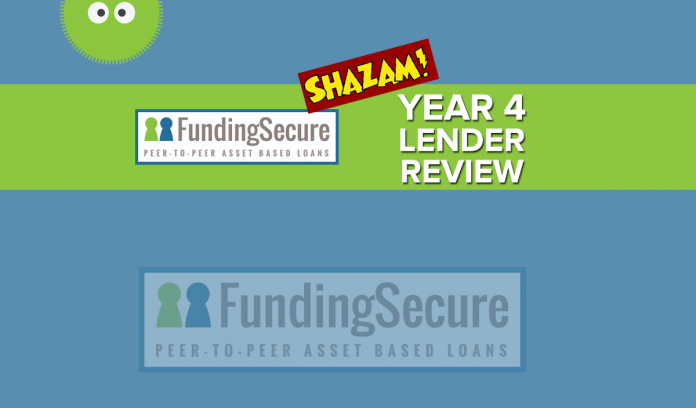Funding Secure – Important Information
** Funding Secure review updated December 30th, 2020 **
Administration Updates:
I recommend all investors join the Funding Secure Action Group. This group was created to act as a point of support and provide co-ordination, news and information to Funding Secure investors affected by the collapse of the platform and to work collectively to recover investments. This group is independent and was created by Funding Secure lenders and is not affiliated with Financial Thing.
Contact fundingsecure@cg-recovery.com with any urgent questions. Key updates will be emailed to investors by the administrator.
What Was Funding Secure And What Happened?
Funding Secure was an online pawnbroking site that offered high-interest rate returns for lenders willing to invest mainly in secured jewelry loans. The company moved away from its roots favouring higher risk property loans. There was a high-risk factor involved since borrowers paid 2.4% in monthly interest, hence the high advertised lender returns.
Loans were given mainly against property but sometimes on items such as jewelry, art, wine, cars and other items. The secondary market offered a possible exit, but held tax implications for buyers.
Bonus interest rates were offered for larger investment sums, usually £10k and higher. New loan flow varied as lender demand and borrower supply was constantly changing.
Funding Secure then offered a 30 Day Acess account which targeted a return rate of 5% gross per year which was extremely low for such a high-risk offering.
Funding Secure became plagued by bad loans and experienced loan fraud where one borrower pledged expensive art items that had been allegedly sold during the loan term to pay other debts. This begs the questions of why these art assets were not held by Funding Secure? Was this a case of misconduct?
In October 2018, the owners of Funding Secure sold 75% of their stake to an investor in what was probably an attempt to save the company.
On October 23rd, 2019, Funding Secured entered administration.
Funding Secure’s failure has come at a bad time for the alternative finance sector which has been growing at a high rate. Tougher regulations by the FCA should help but investors will need to be more educated on risk, diversification and company background in order to be as protected as possible.
I began investing through Funding Secure in June 2015. After four years, I became increasingly frustrated with lending through Funding Secure (and other higher-risk lending companies) as I saw default increases and slow resolutions and communication regarding defaulted loans. I was hopeful Funding Secure’s team could resolve their issues but I wasn’t surprised when Funding Secure announced its administration.
I’ve previously reached out to Funding Secure requesting an interview and office visit but was never successful in obtaining permission. Was this lack of communication indicative of company problems? Probably and it certainly has made me favor more cooperative companies.
Judging by the administrator’s report, Funding Secure may have incorrectly documented the loans insinuating investors’ had lent money to Funding Secure rather than Funding Secure being the direct to borrower lender. This is concerning as we place much trust in peer to peer companies that they legally establish the correct loan paperwork in case of company failure or legal issues.
How Can You Contact Funding Secure?
Email: fundingsecure@cg-recovery.com
UK Tel: 0800 690 6568
When Did Funding Secure Launch?
July 2013
Were They Regulated?
Yes, by the Financial Conduct Authority #698305 under full permissions granted March 31st, 2017. Investments made through Funding Secure are not covered under the FSCS (Financial Services Compensation Scheme).
FCA regulation is nothing like the FSCS, which covers consumers when they deposit money in banks. The FCA reports to the UK government and has the ability to pursue criminal action against companies which violate its standards and codes of conduct.
Funding Secure’s Financial Health
Funding Secure chose not to publish their profit and loss figures but you can view their company accounts here.
How Much Interest Did Funding Secure Pay Lenders?
Rates were usually in the 10-15% range. Sometimes bonuses were offered for larger investment amounts but you usually had to invest £10k + to receive these extra % bonuses.
What Was The Length Of The Loans?
Loans were usually six months to one year but loans could be repaid at any time or renewed.
What Assets Did Funding Secure Use To Secure Loans?
The items borrowed against secured all loans. These items ranged from cars and boats to jewelry and real estate.
What Were The Loan Default / Capital Loss Rates?
Out of Funding Secure’s total loans, the default rate as of September 2019 was 7.6% with 17.7% of loans being overdue. The capital loss rate was 8.2%. This default rate rose from 4.3% (as of September 2018) while the capital loss rate was 9.3%.
You can see the loan book statistics here. Be aware these stats are likely much different now due to the administration.
What Was The Default Handling Like?
I experienced some defaults on past items such as jewelry, cars and property. Handling delivered mixed results mixed with property loans being the most troublesome as expected. I was disappointed by the high number of defaults and lack of communication and was hopeful the new management could resolve these issues.
One of my defaulted loans was recovered after 429 days. The original loan was for six months and because the security was in administration for so long, fees accrued and the recovery amount was less than the capital and interest owed to lenders. Instead of passing the losses to lenders, Funding Secure decided to repay lenders their full capital but not their interest so credit to Funding Secure for this but I’m sure this won’t be the case for the other defaulted loans I own.
Current update
Total loans: 29
Loans in default: 9
Active loans: 20 (8 appear were in trouble or behind)
Of my 29 currently active loans (as of August 2019), nine loans (all property) were in default and unrecovered with five active property loans that were in trouble or behind on payments. Default recovery on property can take years and it’s much more difficult to find a property buyer than a jewelry buyer.
My oldest defaulted property loan has been in recovery since June 2016 and is still unresolved.
Defaults are a part of peer to peer lending and Funding Secure is a good example of how lengthy property default recovery can be and how the expenses can lead to lender losses.
What Happens Now If Funding Secure Is In Administration?
All contracts (loan agreements) between borrowers and lenders will be controlled by the administration company CG Recovery. All uninvested funds should be separately held. Now the administrator goes through the long process of loan redemptions and default recoveries.
This recovery process could take several years and how much money will be returned to investors is unknown. One of the biggest issues with the administration is the expense the administrators charge to handle the process. The higher the cost, the less money will be returned to investors.
The Funding Secure Conclusion
Sadly, I wasn’t surprised Funding Secure went into administration. I watched their loan book experience higher defaults and also watched the reduction of staff and resignation of the people in charge.
Funding Secure’s failure is another lesson on how important diversification is within investing. The failure also highlights how high-interest payment investments come with great risk.
My personal loan book had seen too many defaults likely caused by poor asset security which I was late in spotting as it was early in my peer to peer lending journey.
When I learned of the 30 Day Access account targeting and interest rate of 5% gross per year, I was surprised at such an offering. 5% was far too low for the risk involved with such an account.
I’m now much more cautious investing in property and bridging peer to peer lending due to the risk being difficult to evaluate. There are a few companies that I believe are offering sensible loans. Just be aware of the risks and know that if a loan defaults, the recovery could be a slow process that takes several years to complete.
I hope for a positive outcome for all who have money invested through Funding Secure.
Disclaimers: I have not paid to write my reviews and I’m not employed by any of the companies I write about. In most cases, I have invested or continue to invest my own money through these companies. In order to keep the website financially viable, the sign-up links on this website are referral links and I do accept advertising in the form of banner ads. This advertising in no way influences my reviews and opinions. When you sign up for an account through my website, in some cases I receive a referral fee directly from the companies, at no cost to you. Your support enables me to continue to operate the Financial Thing website. You can read more about my referral links and banner advertising here.
** This Funding Secure page is for information purposes only. This information is not financial advice and has been prepared without taking your objectives, financial situation or needs into account. You should consider its appropriateness for your circumstances. All investing carries risks. Opinions expressed in this review are opinions based on my own personal experiences. The FSCS does not cover peer to peer lending and your capital is at risk. Please don’t invest more than you can afford to lose. **
















